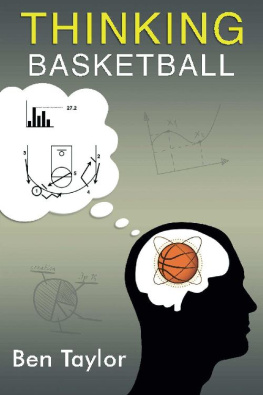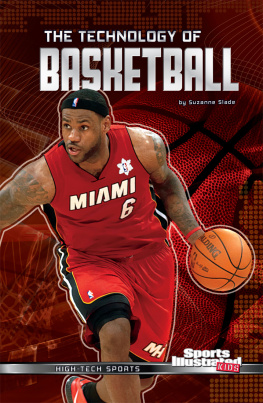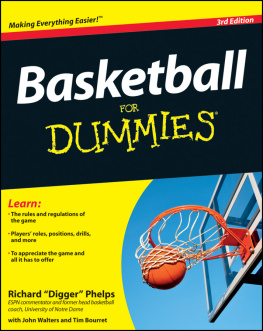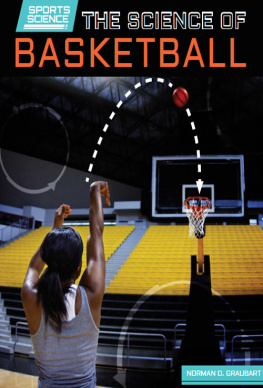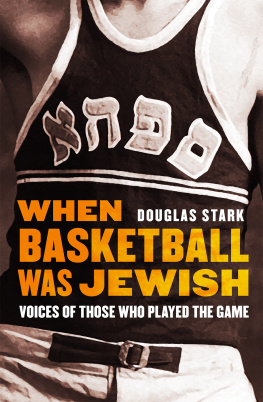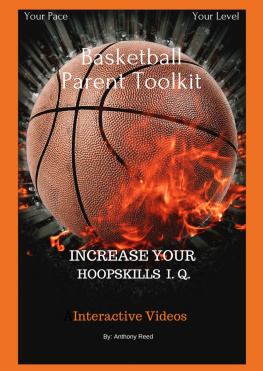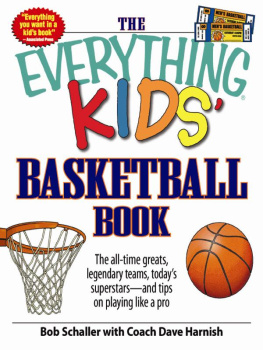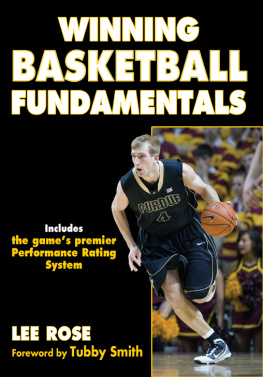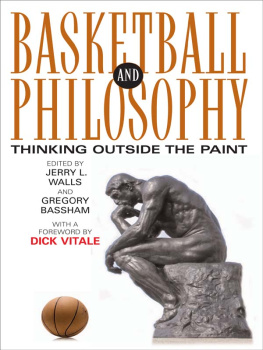Thinking Basketball
BEN TAYLOR
Copyright 2016 Ben Taylor
All rights reserved.
ISBN-10:1532968175
ISBN-13:9781532968174
DEDICATION
For Mei Mei.
ACKNOWLEDGMENTS
A special thanks to my writing mentor for many years, my Uncle Charlie. Also, to Basketball-Reference for their online encyclopedia of basketball information. And to the folks at RealGM for providing the most insightful and thought-provoking basketball discussion on the web.
Table of Contents
Basketball offense is more than individual scoring, it is the effect of a player's actions on his teammates and himself.
A tendency to focus on an individual's scoring while overlooking his other actions that influence the overall team score.
Examining data to quantify the upper bound of observed player impact in NBA history.
A tendency to overlook sample-size (and variance) when making judgments. Instead, we typically factor in sample size only as much as the sample is explicitly stated.
A tendency to overrate how well an individual performed because his team won and underrate how well an individual performed because his team lost.
A tendency to incorrectly weigh events as more important the later they occur in the game, which leads to misperceptions and fallacies about crunch-time.
The false belief that championship rings matter, that one team is worthy of winning every year and that defense wins championships in basketball.
A return to Global Offense, this time as an examination of what interactive skills give teams the best chance of winning a championship.
A tendency to over-credit one player with the majority of a team's success when there are no other all-stars on the team.
A conclusion of the topics in the book.
The Confident Best-Guessing Machine
From December 2009 to March 2010, Kobe Bryant hit an incredible six game-winning shots for the Los Angeles Lakers. During that streak, I ran into a former newspaper colleague who happened to be the biggest Kobe fan I knew.
He was a lifelong Laker fan and per usual, was sporting a gold Bryant (No. 24) jersey when I bumped into him. He immediately started boasting about Kobe's game-winning shots, proclaiming that he was the game's best clutch player.
When was the last time Kobe even missed a clutch shot? he asked. He watched nearly every Lakers game. He was a sports journalist. He loved basketball.
Well, yesterday, I responded.
His eyes shifted up to the sky, scanning his memory of last night's game. He had watched Los Angeles lose to Dallas, 101-96, in a nail-biting game in Texas. After a moment of reflection, he broke into a smile.
Oh yeah, he said.
With 25 seconds remaining and the Lakers trailing by 3, Bryant had missed a potential game-tying jumper. My colleague didn't have a bad memory he was immediately able to recall the play when I reminded him. Like millions of people who discuss and analyze sports everyday, he was falling into subtle cognitive traps; he subconsciously overlooked a negative piece of information that didn't fit in with his preconceived notion about Kobe Bryant.
In many ways, overlooking that missed shot was the impetus for this book. Basketball glorifies these kinds of heroic, late-game plays and a number of other individualistic concepts. The sport's narratives are often shaped by a few, simplified ideas that do not accurately reflect its players or teams.
After years of studying the mind, I realized these narratives are entirely dependent on the principles of our own cognition. The quirks, nuances and rules that govern our perception of the world also shape our stories about basketball, football and baseball. Basketball, in particular, is heavily influenced by these rules, which helps explain common misconceptions. This book is largely about those misconceptions and where they come from.
Thinking itself is a strange subject to study. It can be unsettling to learn that we don't objectively process the world, but instead that the brain interprets everything around us in its own, unique way. For instance, everyone has a blind spot in their vision that the brain simply fills in by, quite literally, guessing at what should be there based on the surroundings. When we walk around and look at the world, we aren't aware of this gap in our vision and are unaware that what fills it might not be out there in the real world!
The more you learn about cognition, the more you realize that our perception of the world isn't even reliable. And it doesn't stop with the senses we have other cognitive blind spots as well. Our memories are faulty we can actually remember things that never happened, but feel like they did. We recall emotional events differently than mundane ones. Our confidence in our memory has little or nothing to do with the accuracy of our recollections. It's all a bit unsettling.
After the dissonance wears off, you learn not to trust everything your brain tells you at face value. It's not that the mind is a liar, it's just that it operates by its own set of rules to overcome its limitations. It has its own version of the truth, but and this is critical the brain never lets on that it's winging it. In this sense, it is constantly making confident best-guesses while masquerading them as absolute truth. This prevents us from ever questioning our own reality.
Consider what the best move in a chess game would be. In theory, there is a set of step-by-step instructions called an algorithm that determine the optimal move. However, to search through all the possible outcomes for this ideal move is an endless task for modern computers, let alone the human brain. Instead, we use rules of thumb educated guesses to avoid sifting through all possibilities for the best answer. This simplification process extends beyond chess into most areas of thinking.
These best-guessing strategies are called heuristics and they govern how we analyze the world at large and how we look at sports. First, we make a decision that is good enough, but not necessarily optimal...and then effectively tell ourselves it is completely optimal. Such confidence is a basic survival requirement if we stopped and kept questioning our answer, wed never act.
In this sense, evolution has rendered the human brain a kind of Confident Best-Guessing Machine. And because we're confident in our best-guesses, we don't stop to question them. When processing our visual field, we don't stop and ask if what we're seeing is real. Similarly, we don't doubt our judgment about Kobe Bryant in the clutch. We rely on our built-in heuristics to paint a picture of the world while assuming that the picture has no blind spots...even when it's rife with them.
Anytime we have to analyze something complex, biases will emerge. Making sense of the thousands of occurrences in a basketball game is no different. We struggle with complexity, when lots of counting is involved (lots of possessions in a game) and lots of pieces are moving at once (there are 10 players on the court). A constant theme is our need to simplify complexity in the world into more manageable, bite-sized pieces. Unfortunately, simplifications aren't always accurate.
Although we are often unaware of it, we are analyzing information all the time. Sports analysis. Political analysis. Social analysis. Survival analysis. It doesn't matter where and when, our analysis switch is stuck on autopilot. We don't need to sit down, organize and make sense of all this information to know a bench seat from an airplane seat, it just happens.
In the same vein, we don't sit down, organize and make sense of a 3-point shot, a reverse dunk or a buzzer-beating jumper. We have developed an intuitive idea of how well someone played in the game we just watched without having to perform any actual conscious analysis. (Such automatic analysis is often termed the Eye Test.) However, even when we do sit down and review the box score, our automatic analysis is running in the background, influencing how we store and catalogue the information.

